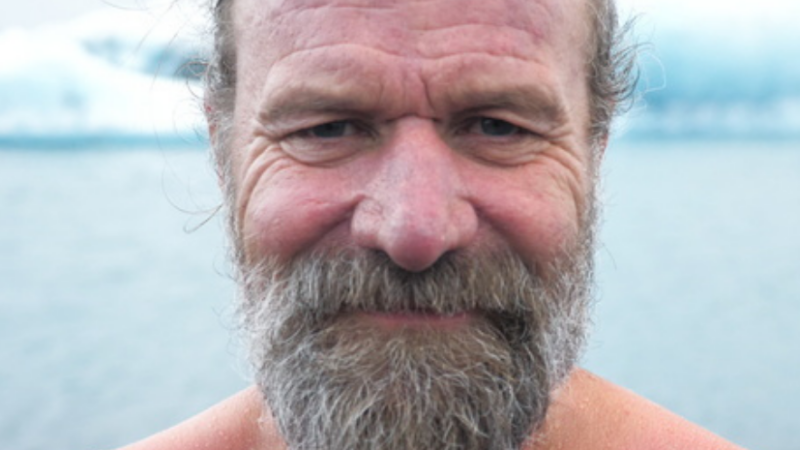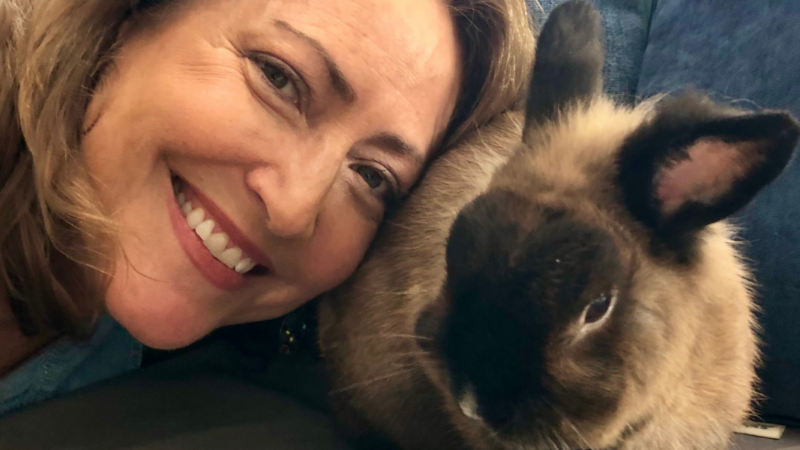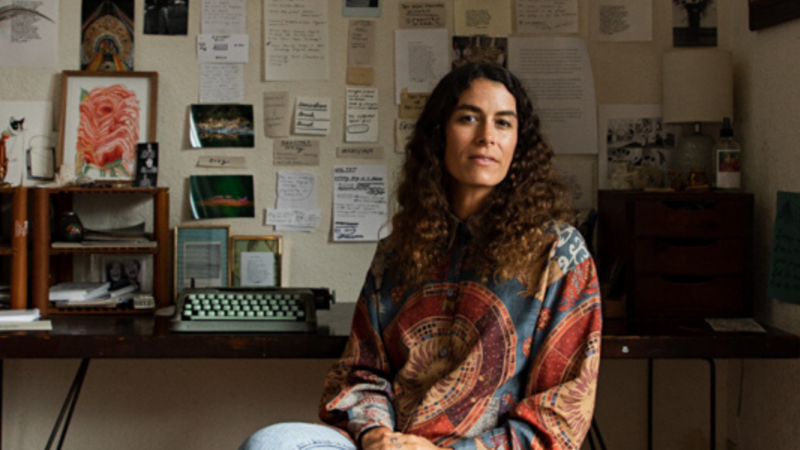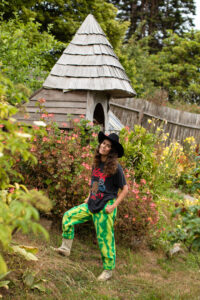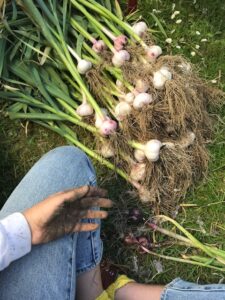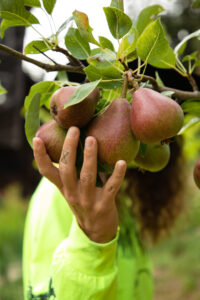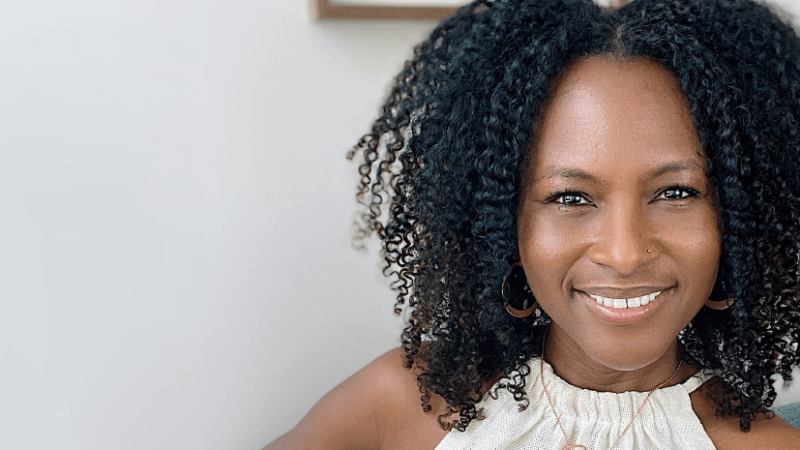-
E117: The Real Work: Letting Go from Within
Michael Singer — October 2, 2025
True spirituality isn’t about mystical experiences or lofty ideals—it’s about honestly facing...
-
Once More: Reflections on Reincarnation and the Gap Between Lives
Tami Simon — September 26, 2025
In this special reflection episode of Insights at the Edge host Tami Simon looks back on her...
-
Honey Tasting Meditation: Build Your Relationship with Sweetness
There is a saying that goes “hurt people hurt people.” I believe this to be true. We have been...
Written by:
Amy Burtaine, Michelle Cassandra Johnson
-
Many Voices, One Journey
The Sounds True Blog
Insights, reflections, and practices from Sounds True teachers, authors, staff, and more. Have a look—to find some inspiration and wisdom for uplifting your day.
Standing Together, and Stepping Up
Written By:
Tami Simon -
The Michael Singer Podcast
Your Highest Intention: Self-Realization
Michael Singer discusses intention—"perhaps the deepest thing we can talk about"—and the path to self-realization.
This Week:
E116: Doing the Best You Can: The Path to Liberation -
Many Voices, One Journey
The Sounds True Blog
Insights, reflections, and practices from Sounds True teachers, authors, staff, and more. Have a look—to find some inspiration and wisdom for uplifting your day.
Take Your Inner Child on Playdates
Written By:
Megan Sherer
600 Podcasts and Counting...
Subscribe to Insights at the Edge to hear all of Tami's interviews (transcripts available, too!), featuring Eckhart Tolle, Caroline Myss, Tara Brach, Jack Kornfield, Adyashanti, and many more.
Most Recent
Wim Hof: The Cold as a Noble Force
Wim Hof is an athlete and extremophile daredevil nicknamed “The Iceman” for his feats of withstanding extreme weather conditions. The holder of more than 20 Guinness World Records, Wim attributes his endurance to specific meditation and breathing techniques. In this intriguing episode of Insights at the Edge, Tami Simon speaks with Wim about the Wim Hof Method of exercises, mindfulness techniques, and cold exposure, and how this regimen can shift our mental perspective as well as physical resilience. Wim describes the ways his practice dovetails with ancient Tibetan Buddhist inner fire meditation and how it alters body chemistry. Finally, Wim describes coldness as a noble force, asserting that by testing our physical limits we also gain a better understanding of the boundless capacities of the human spirit. (72 minutes)
For more information about the Wim Hof Method, please visit wimhofmethod.com.
Meet the Author of . . . Spark Change
The Author
Jennie Lee is the author of Spark Change: 108 Provocative Questions for Spiritual Evolution. In addition to being an author, she is a recognized expert in the fields of yoga therapy and spiritual living. She has taught classical yoga and meditation for more than 20 years, and coached private clients in the practices that integrate life spiritually, mentally, emotionally, and physically. She is also the author of the award-winning books True Yoga: Practicing With the Yoga Sutras for Happiness & Spiritual Fulfillment and Breathing Love: Meditation in Action. She lives in Hawai‘i with her husband and bunnies. For more, see jennieleeyogatherapy.com.
The Book
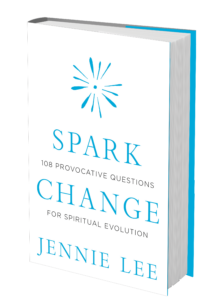 It’s been said that finding the right question is as important as finding its answer. As author Jennie Lee writes, “Quality questions lead to quality answers. Questions promote deeper thought, connection, authenticity, and humility.” In Spark Change, Lee shows you how to identify your most important personal questions and explore how they might redefine the trajectory of your life.
It’s been said that finding the right question is as important as finding its answer. As author Jennie Lee writes, “Quality questions lead to quality answers. Questions promote deeper thought, connection, authenticity, and humility.” In Spark Change, Lee shows you how to identify your most important personal questions and explore how they might redefine the trajectory of your life.
Send us a photo of you and your pet (and let us know if your pet had any role in helping you write your book)!
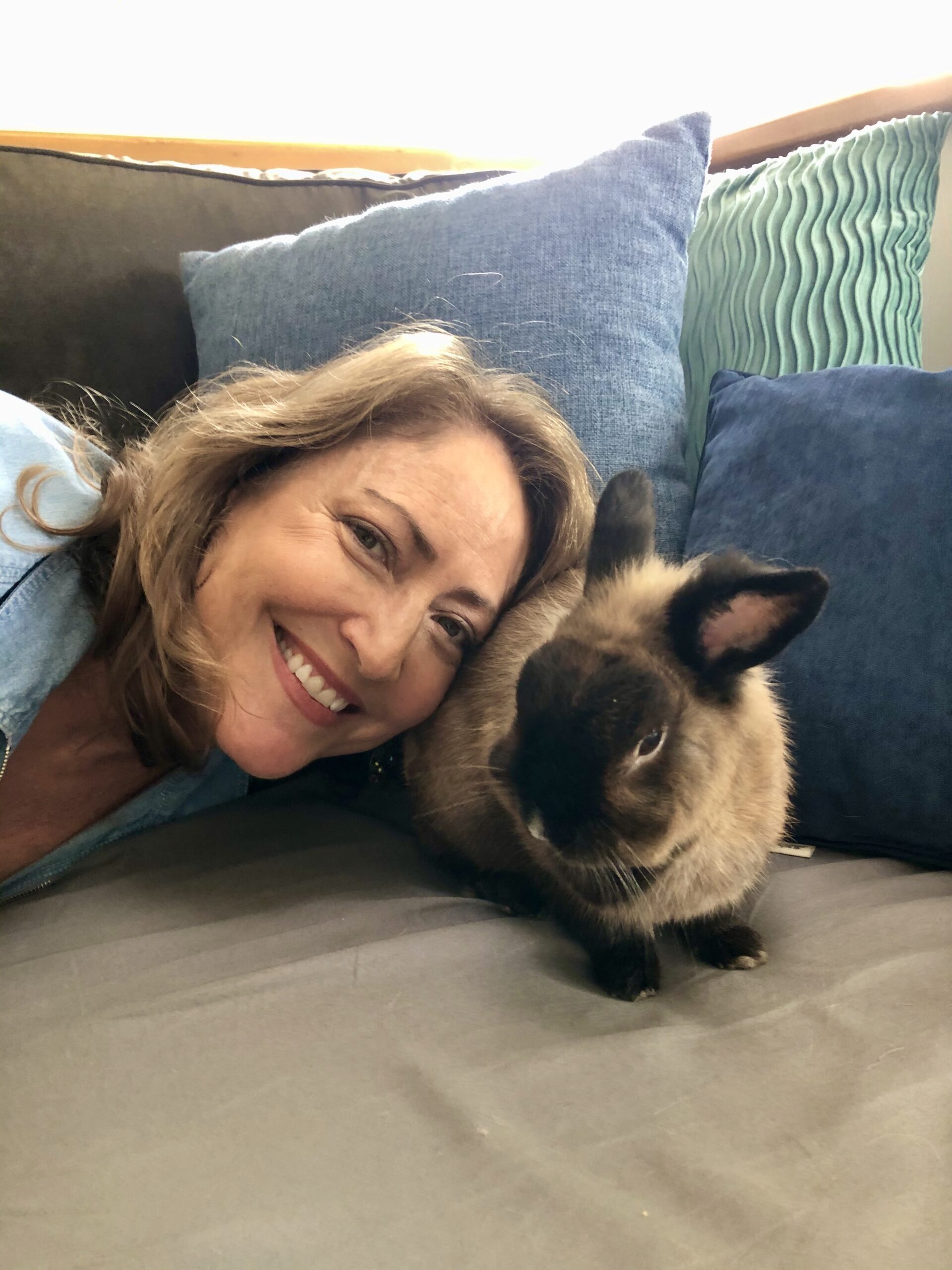
Most evenings I share a little couch time with my house bunny Toki. As prey animals, rabbits sense energy, so if I have had a tense day and carry any agitation into snuggle time, Toki will nip my leg as if to say, “calm down!” Relaxing with the bun reminds me to let go of what I can’t control, and to practice being peaceful in the present moment. Toki time in the evening reinforces what I write about in Spark Change—the necessity of self-reflection and accountability for what needs changing within myself. And he is a darn cute teacher.
What is something about you that doesn’t make it into your author bio? It could be something that impacts your work, or something totally random and entertaining!

Although I grew up in Southern California, I was always a bit afraid of the ocean. When I moved to Hawai‘i, I wanted to get beyond this fear, so I taught myself how to surf. Now, paddling out at dawn into the gorgeous turquoise water is one of the best things about my day. The focus that is required to catch a wave is an apt metaphor for accomplishing anything in life, and the exhilaration that comes when I make the drop and take the ride is pure joy.
What was your favorite book as a child?
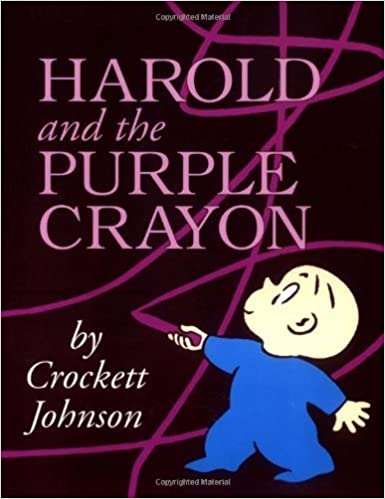
As an only child, I played alone a lot. I loved Harold and the Purple Crayon because Harold drew himself into his own adventures, created his own frightening dragons, and saved his own life by imagining a new way home. Imagination is essential to living a creative life and this story illustrates how we craft our experiences through our thoughts. Ever since childhood, I have been learning how to design, with greater intention, the life of my dreams by eliminating dead ends in my thinking and replacing them with new roads home.
Learn More
Sounds True | Amazon | Barnes & Noble | Bookshop | IndieBound
Meet the Author of . . . Every Day Is a Poem
The Author
Jacqueline Suskin has composed over forty thousand poems with her ongoing improvisational writing project, Poem Store. She is the author of six books, including Help in the Dark Season. Her work has been featured in the New York Times, the Atlantic, and Yes! magazine. She lives in Northern California. For more, see jacquelinesuskin.com.
The Book
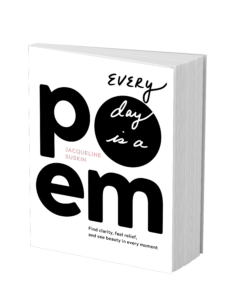
How do we deal with the heaviness of everyday living? When we are surrounded by uncertainty, distrust, and destruction, how do we sift through the chaos and enjoy being alive?
In Every Day Is a Poem, Jacqueline Suskin aims to answer these questions by using poetry as a tool for finding clarity and feeling relief. With provocative questions, writing practices, and mindset exercises, this celebrated poet shows you how to focus your senses, cultivate curiosity, and create your own document of the world’s beauty. Emphasizing that the personal is inextricable from the creative, Suskin offers specific instructions on how to make a map of your past and engage with your pain to write a healing poem.
Show us a day in your life.
I’m currently the Artist in Residence at Folklife Farm, where I spend my days writing, reading, teaching online and working in the garden.
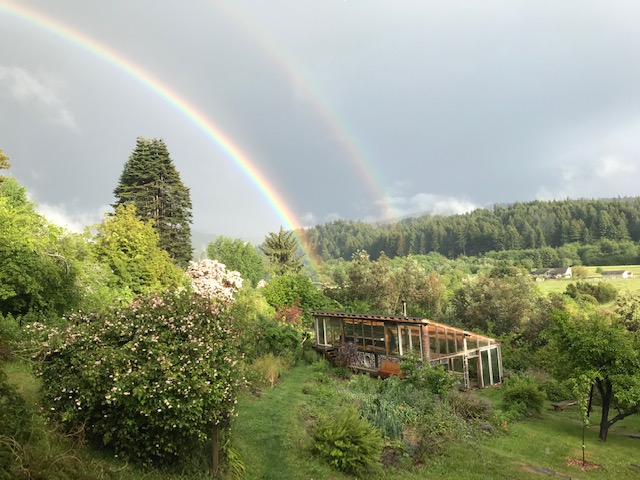
I wake up and take care of my body, dance, stretch, and harvest something for breakfast.
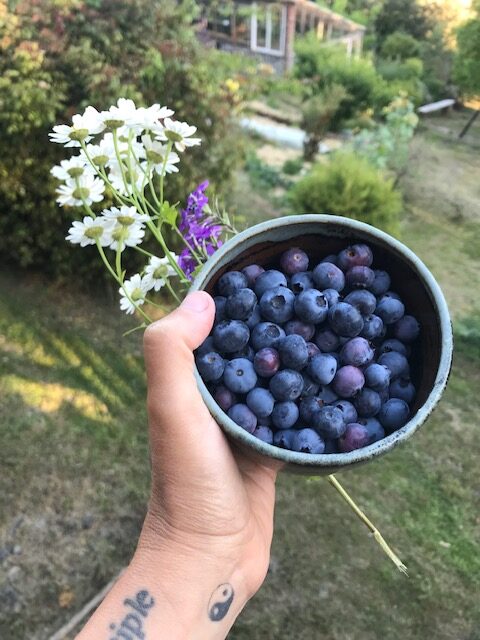
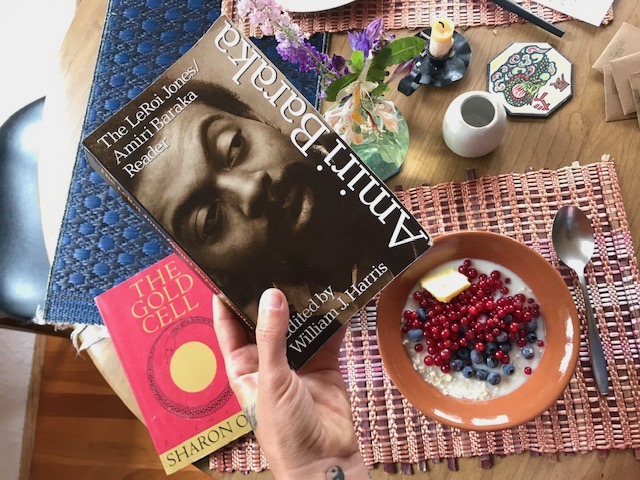
Then I usually work at my desk until late afternoon when I find my way back to the garden for more harvesting and chores.
When I’m working on a book, I’ll wake up around 4 am to write before anyone else is awake. I know that whenever I wake up in the dark with an idea, it’s my job as a poet to turn the light on and write it down.
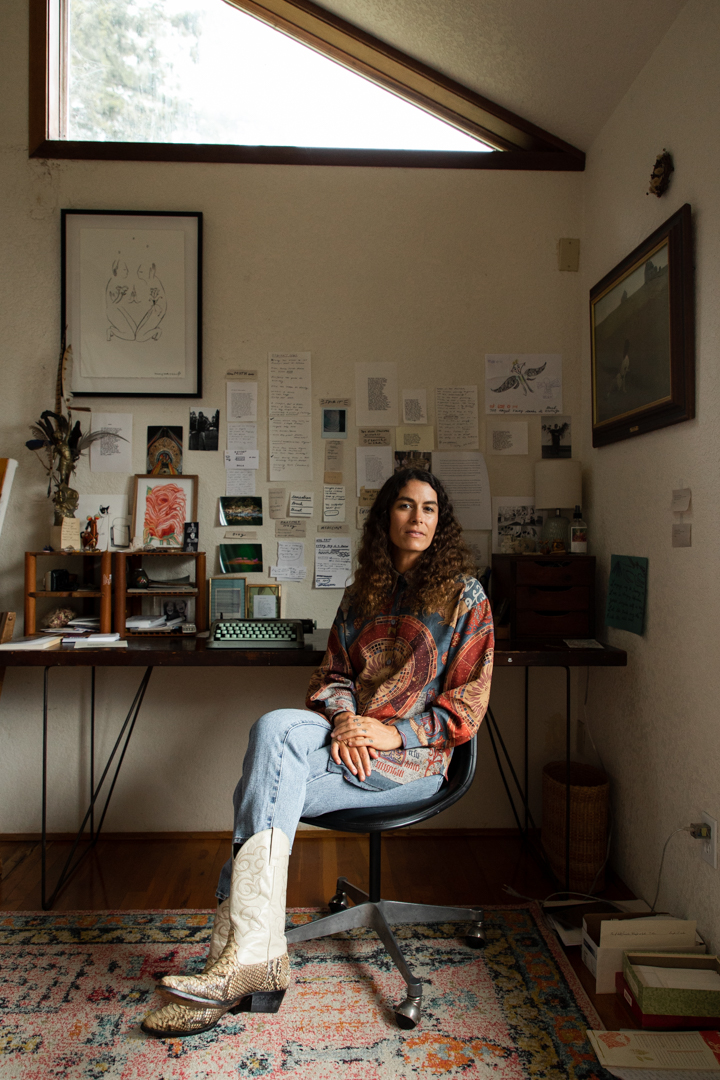
With this schedule, my days are fluid; and although I make showing up at my desk a main priority, I never forget that it’s summer and there are rivers to swim in, flowers to smell, and berries to pick.
Are you learning any new tricks or skills during this time (COVID)? What’s been hardest for you? What do you miss the most? Has your book taken on a new meaning in the world’s current circumstances? Is there anything you would have included in your book if you were writing it now?
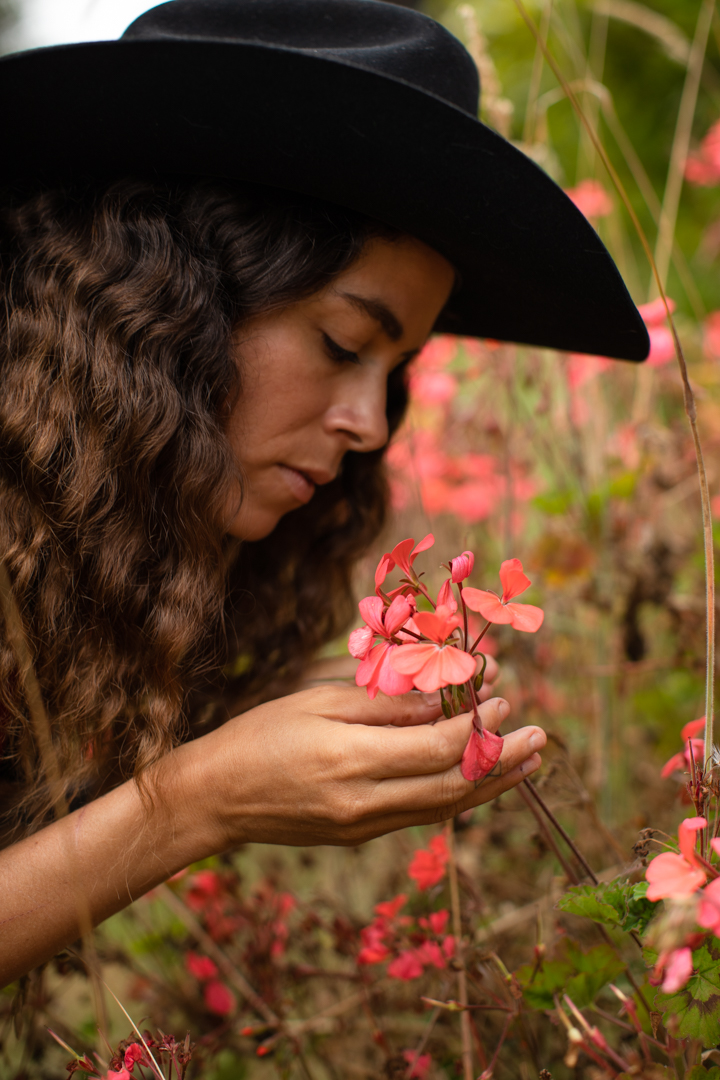
During quarantine, I had to shut down the retreat program I was running at Folk Llife Farm. This was a sad shift, as we had folks signed up to stay for months in advance. Now that I’m not spending my time hosting or interacting with my local community in person, I’m engaging with my online community in a larger capacity. I miss sitting in front of my audience, writing for people after looking them in the eye, and I really miss browsing bookstores. I miss hugging my friends, having teatime and long conversations, and I miss going on tour. But I can’t complain. Poetry has its place in the world now more than ever. I’m here to translate the communal mood, to voice our collective pain, and find the beauty in all of it. My book will help others do this as well. And if there’s one thing COVID has taught me, it’s that we all need an outlet for our emotions, especially when we feel unseen and disconnected. Poetry is this outlet and we can still share it even if we can’t be with one another in person.
What is something about you that doesn’t make it into your author bio?
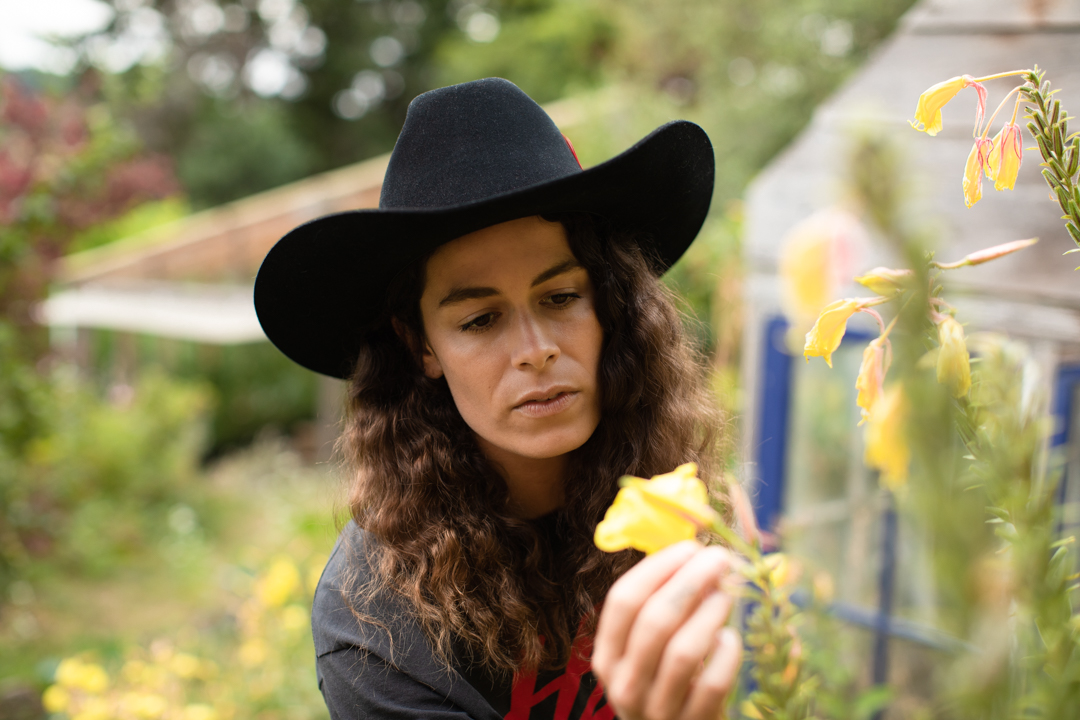
I’m an ecstatic earth worshiper. Everything I do, every word I write, is attached to the idea that when my readers discover healing through my words, when they transform and become better by way of my work, they’ll in turn treat themselves, each other, and the earth better. This planet is a perfect gift and humans have ruined so much of it. Through my efforts as a poet, I hope to pay tribute to the earth and offer up ways for humans to change their relationship to our one and only home.
Photos of Jacqueline Suskin by James Adam Taylor
Photos around Folklife Farm by Jacqueline Suskin
Learn More

Sounds True | Amazon | Barnes & Noble | Indiebound | Bookshop
Customer Favorites
An Intimate Guide to Awakening Your Erotic Life
Dear friends,
I’ve always said that if we could solve just one problem in our lives, coming to terms with our sexual selves would solve all of the others. Whether we are actively sexual or not, the deepest aspects of our identity are shaped by our erotic souls.
Becoming intimate with our sexuality is the key to fully engaging with our lives and finding physical and emotional well-being . . . which sounds great, but how do you begin to move in this direction?
I have been married to the same man for over 30 years, and I can tell you that the journey to sexual wholeness is not easy. I remember a moment when sexual wounds had all but destroyed our marriage. And then something totally unexpected happened—a truce that gave us both the courage to turn towards our sex life and each other. It was the beginning of sex that works in my own life.
In my new book, Sex That Works, I share stories from my own erotic transformation, from the couples with whom I’ve worked with as a professional loveologist, and from my research and ongoing conversations about relationships, intimacy, and sex as the founder of Good Clean Love, maker of organic products for sexual health. To help you dig in and understand your own intimate story, I offer practical exercises for building skills to reclaim intimacy, renew curiosity, and ultimately realize your true erotic potential.
Think of this book as a road map for your journey back to your own erotic self—one that will allow you to reach into the really tender places and encourage your truth to flow freely. It’s been an honor to spark this kind of inner dialogue for women, and my hope is that you will find that reading Sex That Works is like talking to a dear friend late at night over a warm cup of tea.
Wishing you wellness on your sexual journey,
Coffee Meditation

During the twenty years I lived in a meditation center, I rushed through my morning coffee. After all, if I didn’t drink it fast enough, I’d be late for meditation. It was important to get to meditation on time; otherwise, one had to endure the social stigma of being late (obviously lacking the proper spiritual motivation), as well as the boredom and frustration of having to wait outside the zendo to meditate until latecomers were admitted.
When I moved out of the center, I had to learn to live in the world. I had been institutionalized for nearly twenty years. Now I was out and about. What did it mean? There was no formal meditation hall in my home. I could set my meditation cushion in front of my home altar, or I could sit up in my bed and cover my knees with the blankets. There were no rules.
Soon, I stopped getting up at 3:30 am. Once I did awaken, I found that a hot shower, which had not really fit with the previous circumstances, was quite invigorating. Of course, getting more sleep also helped.
Then I was ready for coffee—hot, freshly brewed, exquisitely delicious coffee. Not coffee in a cold cup from an urn; not coffee made with lukewarm water out of a thermos; not coffee with cold milk, 2 percent milk, or nonfat milk—but coffee with heated half-and-half. Here was my opportunity to satisfy frustrated longings from countless mornings in my past. I would not have just any old coffee, but Peet’s Garuda blend—a mixture of Indonesian beans—brewed with recently boiled water and served in a preheated cup.
Unfortunately, by the time I finished the coffee, I had been sitting around so long that it was time to get started on the day, but I hadn’t done any meditation. With this heavenly beverage in hand, who needed to meditate?
The solution was obvious: bring the ceremoniously prepared coffee in the preheated cup to the meditation cushion. This would never have been allowed at the center or in any formal meditation hall I have visited, but in my own home, it was a no-brainer. Bring the coffee to the cushion—or was it the other way around?
I light the candle and offer incense. “Homage to the Perfection of Wisdom, the Lovely, the Holy,” I say. “May all beings be happy, healthy, and free from suffering.” I sit down on the cushion and place the coffee just past my right knee. I cross my legs and then put the cup right in front of my ankles. I sit without moving so I don’t accidentally spill the coffee. I straighten my posture and sip some coffee.
I feel my weight settling onto the cushion, lengthen the back of my neck, and sip some coffee. Taste, enjoy, soften, release. I bring my awareness to my breath moving in, flowing out. If I lose track of my breath, I am reminded to take another sip of coffee—robust, hearty, grounding. Come back to the coffee. Come back to the breath.
A distraction? A thought? Sip of coffee. Enjoy the coffee. Enjoy the breath. Focus on the present moment. Remembering the words of a Vipassana teacher of mine: “Wisdom in Buddhism is defined as the proper and efficacious use of caffeine.”
I stabilize my intention. “Now as I drink this cup of coffee, I vow with all beings to awaken body, mind, and spirit to the true taste of the dharma. May all beings attain complete awakening at this very moment. As I visualize the whole world awakening, my mind expands into the vastness.
Friends, this is one of the teaching stories that is shared in my new book, The Most Important Point. This offering comes to you with my gratitude for the efforts of Danny S. Parker, who edited over 60 of my Zen talks for inclusion in this volume.
Lastly, I invite you to try the Tea and Ginger Muffins recipe that accompanies this story. Danny must have enjoyed them!

Edward Espe Brown is a Zen Buddhist priest and was the first head cook at Tassajara Zen Mountain Center.
Danny S. Parker is a longtime student of Brown’s and is an ordained Zen Buddhist priest.

Pick up a copy of Edward Espe Brown’s newest book, The Most Important Point, today!
Spiritually Fly
Faith Hunter has nearly 20 years of experience as a yoga and meditation teacher. She is the founder of Embrace Yoga DC and Embrace OM, as well as the creator of Spiritually Fly, a lifestyle philosophy that celebrates our inherent vibrancy and worth. With Sounds True, Faith has written a new book called Spiritually Fly: Wisdom, Meditations, and Yoga to Elevate Your Soul. In this episode of Insights at the Edge, Tami Simon speaks with Faith about what it means to be Spiritually Fly and how we can all live an authentic, joyful life of spiritual flyhood. They discuss the life-changing effect yoga had on Faith’s life and the courageous way she empowered herself to blend classic yoga lineages with sound, ritual, and African traditions to create a practice that is true to her. And Faith describes the “golden glitter”—the inner brilliance—that lies beneath our fear, shame, and other “demons,” waiting to be released into the world.

